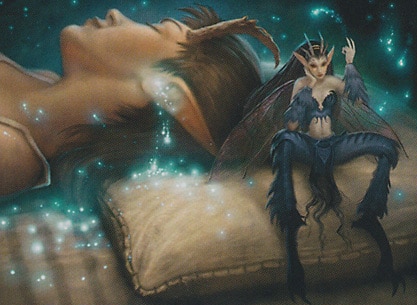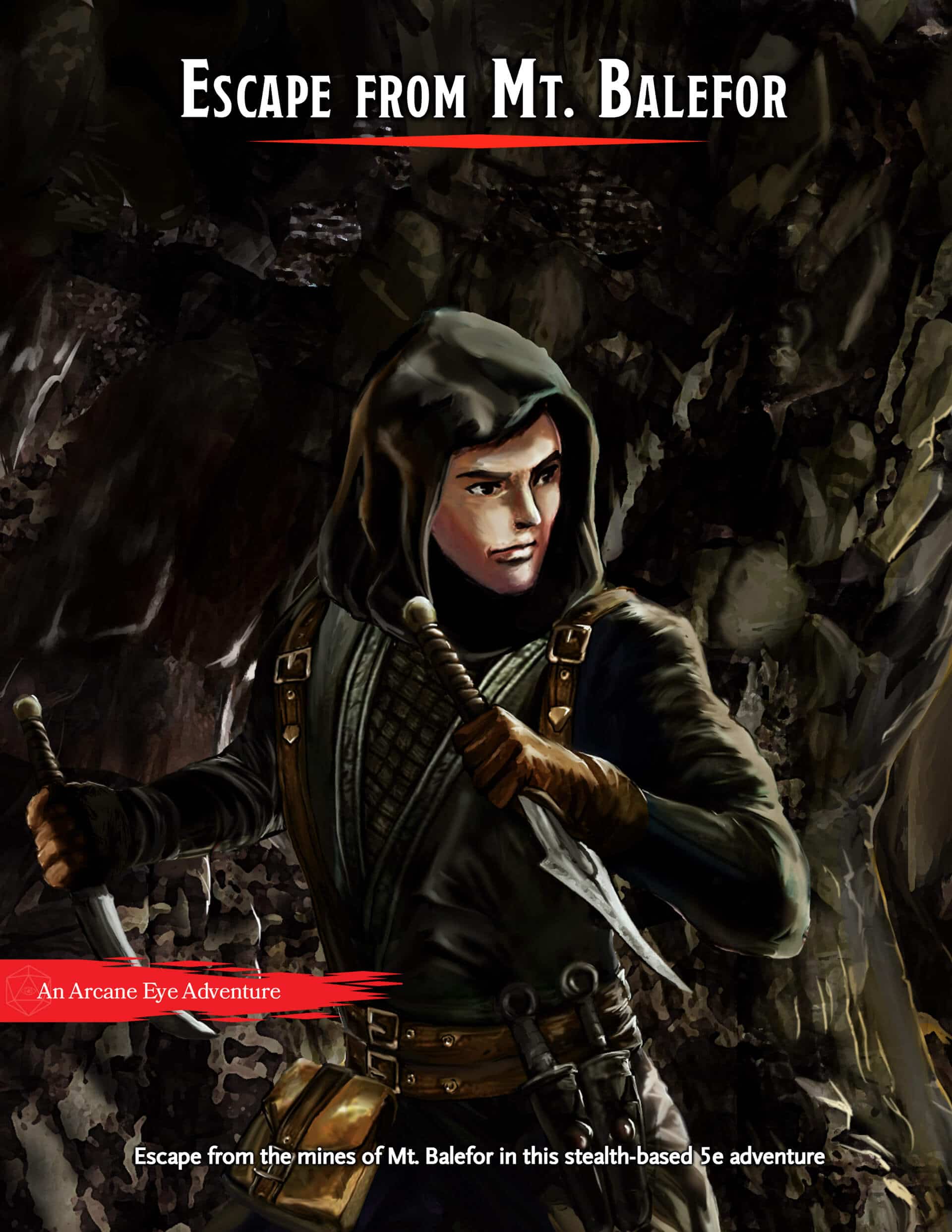5e Sleeping
Published on February 19, 2023, Last modified on December 27th, 2023

Dream Salvage - Wizards of the Coast - Howard Lyon
Table of Contents
Sleeping in D&D
No matter how powerful someone is, they all need to rest at some point. With very few exceptions, nearly all heroes need to sleep at some point. Or, you may want to lull your enemies to a slumber for your own needs.
Either way, we’ll give you the low-down on these Z’s in this article and how it all works in D&D! So let’s get started.
What is Sleeping in 5e?
Within 5e, sleep has returned but isn’t quite impactful. It’s still not a condition, but characters still need to sleep.
When a creature is asleep, they fall under the unconcious condition, meaning:
- They are incapacitated, can’t move or speak, and are unaware of their surroundings.
- They drop whatever it’s holding and fall prone.
- They automatically fails Strength and Dexterity saving throws.
- Attack rolls against them have advantage.
- Any attack that hits them is a critical hit if the attacker is within 5 feet of the creature.
Long Rests
Long rests are the primary way to get sleep in 5e. Usually, mechanics revolving around sleep need 6 hours to satisfy the requirements of getting enough sleep. Long rests in particular need creatures to spend at least 6 hours sleeping (for races that need to sleep, that is) to gain benefit.
Going Without Sleep
If your character opts not to sleep at all, you’ll begin to go through a mechanic known as exhaustion. These rules were originally in the Player’s Handbook but were expanded upon with Xanathar’s Guide to Everything. With these new rules, if players opted not to sleep for multiple days, they would need to pass successive Constitution checks. These checks start at DC 10 and increase by 5 for every 24 hours gone without sleeping. On an unsuccessful check, they gain a level of exhaustion.
Waking Someone
A creature that isn’t under effects of an ability keeping them asleep can be awoken by taking damage or if an action it taken to shake them awake. While whispers won’t disturb the average sleeper, a creature with a passive Perception of 20 or higher will be awoken by whispers within 10 feet of them.
Mechanics that affect Sleeping
There aren’t a lot of mechanics that affect sleep, but we’ll cover what is included.
Sleeping in Armor
Xanathar’s Guide to Everything states that if you sleep in medium or heavy armor, you only regain a quarter of your spent Hit Dice, instead of half. Sleeping in uncomfortable armor also prevents you from reducing exhaustion, if you have any levels of exhaustion.
Character Options
Races
Elves, shadar-kai, eladrin, sea elves, Warforged, autognomes, and thri-kreen don’t need to sleep and aren’t affected by abilities that would put them to sleep.
Locathah have advantage on effects that would put them to sleep.
Oddly enough, kalashtar are able to sleep but not dream, so spells and effects that require them to dream have no effect.
Warlock: The Undying
Starting at level 10, these warlocks no longer require sleep. However, they do still need to rest to prevent gaining exhaustion.
Coffeelock
Coffeelocks are warlock/sorcerer multiclasses that exploit a warlock’s ability to gain spell slots on a short rest. They use the sorcerer’s flexible casting to convert warlock spell slots into sorcery points, then transform them back into spell slots when needed.
If DMs don’t follow the rules for sleep in Xanathar’s Guide to Everything, coffeelocks can generate spell slots even without long resting, which is unique for full casters.
Spells
Sleep: the sleep spell imposes the unconscious condition on affected creatures. They are awakened when damaged and when an action is used to wake them up, which mimics other rules for sleeping. Unfortunately, the sleep spell only lasts 1 minute.
Dream: This nasty spell can be used on creatures that dream night after night to prevent them from gaining the benefits of a long rest. According to the rules from Xanathar’s Guide to Everything this means that they would be at risk of dying due to exhaustion within a week in most cases.
Sleep in Different Editions of D&D
Resting and sleeping were entirely optional in the original D&D. Surprisingly enough, the Player’s Handbook doesn’t mention characters needing to take rests, but there are some mentions of sleeping.
However, there were some changes when 3.5 came around. Characters who didn’t sleep during long rests wouldn’t gain any HP back, and wizards couldn’t recover their spell slots. But still, sleeping wasn’t a big deal until 4e.
4e would introduce the need for resting, but most interestingly would remove sleep entirely. After Heroes of the Fallen Lands was released, the keyword was removed, and the “Sleep” action only knocked people unconscious.
All Wrapped-Up
Sleeping isn’t much of an explored mechanic within D&D 5e. Significantly few things affect the need to sleep, and the sleep condition wasn’t even included in this or the previous edition. While it may not be necessary from a mechanics standpoint, it’s still something to keep in mind for realism. And to prevent Exhaustion, which is a terrible condition.
What are your thoughts on sleeping in 5e? Did we miss something here? Let us know in the comments below!
5e Sleeping FAQs
What is the Sleep condition in 5e?
There isn’t one in 5e. Instead, characters that are put to sleep are instead considered to be unconscious.
Do you need to sleep in 5e?
If your DM decides not to follow the rules in Xanathar’s Guide to Everything, there really aren’t any repercussions to not sleeping. However, this still ends up being up to the discretion of your DM.
How much sleep do you need in 5e?
In most cases, a character needs to sleep somewhere between 6-8 hours each day to be considered fully rested.
